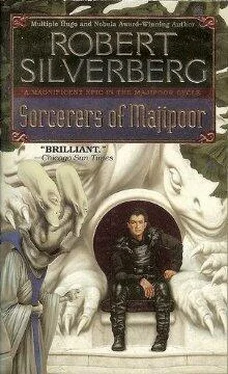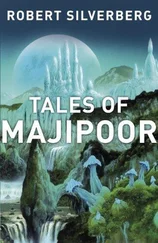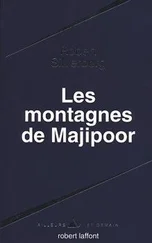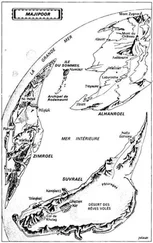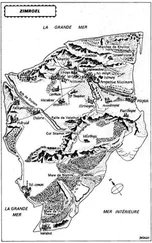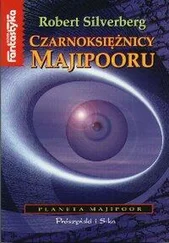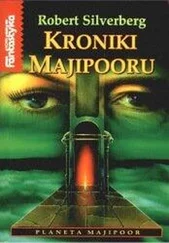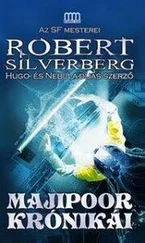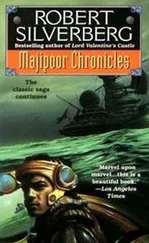You are not Prestimion of Muldemar now, he told himself. You must be Septach Melayn, or else you are a dead man.
For years Prestimion had studied Septach Melayn’s swordsmanship with keen pleasure. It was a thing of utter beauty. It was poetry; it was music; it was mathematics. It was also a matter of quickness of wrist and keenness of eye and intelligent extension of arm. And Septach Melayn’s natural grace and preternaturally elongated limbs gave him an innate advantage in all those aspects. Prestimion, short and compact and sturdy, was built to a different plan. But he would do what he could.
Before him stood the true author of all his grief—that much he understood now. Nothing unhappy had befallen him that Dantirya Sambail had not had a hand in, somewhere. Prestimion felt himself grow hot with fury. Strike at him, he thought, and you are striking at all your misfortunes in a single thrust.
Dantirya Sambail came rushing at him with the axe again, and the saber held ready for the killing stroke after it. Prestimion stepped slightly to one side and pivoted, and then went darting boldly in under his ponderous opponent’s onslaught, coming so close that the axe could not strike him. And even in those close quarters was able deftly to bring the tip of his sword straight upward into the pit of the Procurator’s arm, piercing a path through nerve and muscle and tendon.
“Ha!” cried Dantirya Sambail in surprise and pain, and let the axe go clattering from his numbed hand. But there was enough presence of mind and sheer ferocity in him to bring the saber in his other hand around and strike Prestimion a terrible blow in the ribs with the flat of it, even jammed up against each other as they were. It knocked the breath from Prestimion and darkened his senses a moment, so that he went reeling back some five or six steps and came close to falling.
The Procurator ran heavily toward him and loomed over him, flushed and excited with the thrill of impending triumph, and jabbed at him with the saber. But it was a left-handed thrust poorly launched. Prestimion, though he was wincing from the pain in his battered side and the wound he had received earlier from Mandralisca, lifted his sword and brought it dancing through Dantirya Sambail’s guard, probing for his heart and forcing him to move the saber aside to parry. And then with a quick reversal of direction that would have brought applause from Septach Melayn, he drew the tip of the rapier along the inside of the Procurator’s sword-arm, cutting a long bright red line down it from elbow to wrist.
Dantirya Sambail’s sword fell clattering to the ground. Instantly Prestimion had the point of his own against the underside of his opponent’s out-thrust jaw, where the soft flesh was.
“Go ahead,” the Procurator said. “Shove it home, cousin!”
“What a pleasure that would be,” said Prestimion. “But no. No, cousin, no.” Not like this; not the slaughter of a prisoner, even this one. He could not. He would not. All his wrath had turned away. There had been enough killing for now. And Dantirya Sambail, evil though he was, was somehow much beloved in his own land of Zimroel. Prestimion would not want the hatred of the millions of people of Zimroel when he was Coronal.
He saw his brother Abrigant coming up out of the chaos of the field toward him, and Rufiel Kisimir of Muldemar, and four or five other men of his city with them. The poison-taster Mandralisca was with them, wounded and a prisoner, his wrists tied behind his back and one side of his face streaming red. He was glaring sullenly, as though he would gladly spit forth a tide of venom upon them all.
They observed Prestimion holding Dantirya Sambail at bay, and sped up beside him now, Abrigant seizing one of the Procurator’s bloodied arms and Rufiel Kisimir the other and pulling them around hard behind his back.
“Strike, brother!” Abrigant cried. “What are you waiting for?”
“This is not the appointed hour of his death,” said Prestimion quietly, putting down his sword. He drew breath, grimacing, and rubbed at his aching ribs. “Take him and bind him and put him under safe guard. He’ll rest a time in the tunnels of Sangamor, and then the courts can have him. On some other day will he die, and not at my hands. Take the poison-taster too. But see to it that they are kept in separate places far from one another.” And he walked away, leaving Dantirya Sambail astounded and gaping behind him.
Navigorn said, “We are lost, and no question of it. Our army is reduced to a rabble that can’t even find the proper way to flee; Prestimion’s men are everywhere around us and they know that victory is theirs. I see Farholt dead on the field, and Farquanor too, and many another. We should go to Prestimion and yield to him before more lives are lost, including our own.”
Korsibar gave him an incredulous stare. “What? Surrender, is that what you advise, Navigorn?”
“I see no other path for us.”
“This is not the first battle we’ve lost in this war.”
“This is our worst defeat. And this time he’ll take us both prisoner, and your whole Council as well.”
“You no longer call me ‘my lord,’ I notice.”
Navigorn made a sorrowful gesture. “What can I say? We have thrown our dice and the fall is against us. The game is over, Korsibar.”
They were unbearable words. In his first hot rage, Korsibar came close to raising his sword against Navigorn. But he held his hand and said simply, in the darkest and bleakest of voices, “I am still Coronal, Navigorn. There will be no surrender. And you are dismissed from my service.”
“Yes,” Navigorn said. “That I am.”
He turned and walked swiftly away across the muddy bloodied field. Korsibar let his gaze follow after him for a long moment. He felt nothing. Nothing. He was moving into a place beyond all feeling now. There was a cold numbness stealing over his body, traveling upward from his legs toward his heart, and from there to his brain.
I never wanted to be king, he thought. It was put in my path, and I snatched it up as if in a dream.
“What have you all done to me?” he said aloud. And then: “What have I done?”
It was a catastrophe beyond all prediction. Dead men lay all around him. His maguses had told him that this would be a day of victory, that all the final reckonings would be made this day, that by nightfall Majipoor would have only one Coronal and the world would be at peace again. In his rashness he had allowed himself to draw a dear assurance of his triumph from those prophecies.
But now—look—look—
He moved numbly onward through the scene of the disaster, his face set like stone. Then the unmistakable form of Sanibak-Thastimoon rose up before him in the shadowy afterdawn of the muddy darkness that Prestimion’s sorcerers had called down upon them.
“You,” Korsibar said. Some heat returned to his soul. His voice was thick with rage. “You lied to me!”
“Never, my lord.”
“A day of victory, you said. A day of final reckonings.”
“And so it is,” said the Su-Suheris coolly. “Were we not correct in our prognostication? For surely there has been a victory here today.”
Korsibar’s eyes widened. He saw now how Sanibak-Thastimoon had gulled him: or rather, how he had gulled himself by reading what he wished to hear into the mage’s words.
He swept his arm across the field before them. “How did you allow this to befall us? Was there nothing you could have done to protect us? Look, Sanibak-Thastimoon, look! We are entirely put to rout’ ”
“He had the mightiest sorcerers of Majipoor arrayed among his troops. I am not invincible, my lord.”
“You could have warned me that he’d somehow snuff out the sun at noon. We might have taken some steps to hold our line when the darkness came.”
Читать дальше
